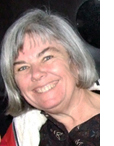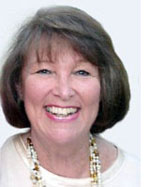| |
|

San Diego Jewish World begins weekly email service
SAN DIEGO—Call it a case of listening to our readers. Some have told us that they like receiving emails listing the headlines in San Diego Jewish World, but daily service is more than they can keep up with. So we now are offering readers an option. You may sign up for the daily service or a new weekly service.
The daily service tells you each eveing what our headlines will be in the Sunday, Monday, Tuesday, Wednesday, Thursday or Friday morning editions. (We don't publish on Shabbat).
On the other hand, the weekly email will advise you on Thursday nights or Friday mornings (depending on what time we publish our Friday edition) what the headlines were from the past Friday to the current Friday. That way you'll have plenty of time over the weekend to catch up on your reading, should you desire.
Here is a link to the daily email signup. And, here is a link to the weekly signup.
We are always interested in your comments on how we may improve our publication and make it of greater service to readers.
AGENCY FOR JEWISH EDUCATION

L'shanah tovah tikoteva
FRIDAY, SEPT. 26-SUNDAY, OCT. 5 LYRIC OPERA'S CANDIDE
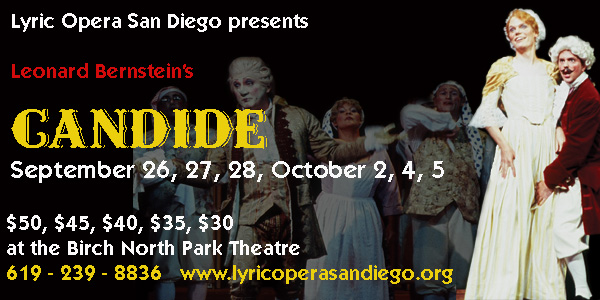
MON., SEPT. 29-THURS., OCT. 9 Congregation Beth Israel High Holiday Services


CAMPAIGN 2008 Guest column
'Israel's security is sacrosanct,' Obama
tells 900 rabbis in conference call
By Eric Lynn and Dan Shapiro
CHICAGO—Senator Barack Obama participated in a historic national conference call on September 17, with over 900 Rabbis representing all the major denominations in American Jewish life. He extended to the Rabbis his personal New Year's greetings as they prepare to celebrate Rosh Hashanah with their communities later this month. Never before have so many of America's Rabbis come together to hear a major Presidential nominee reflect on his relationship with the Jewish community and share his vision for a better future.
Senator Obama discussed the pressing issues at stake - for both Jewish Americans and all Americans - in the upcoming election. He asked that, as we think about the coming New Year, we also reflect upon our common vision for America's renewed promise.
Several leading Rabbis spoke and posed questions to the Senator, including Rabbi Jeffrey Wohlberg, of the Rabbinical Assembly of Conservative Judaism; Rabbi Tzvi Hersh Weinreb of the Orthodox Union; Rabbi Eric Yoffie of the Union of Reform Judaism; and Rabbi Dan Ehrenkrantz of the Reconstructionist Rabbinical College. Introducing Senator Obama were Rabbi Sam Gordon of Congregation Sukkat Shalom in Wilmette, Illinois, and Rabbi Elliot Dorff, Vice-Chair of the Conservative Movement's Committee on Jewish Law and Standards and Professor at the American Jewish University in Los Angeles, California. Rabbi Gordon, along with Rabbi Steve Bob, is co-founder of Rabbis for Obama, a grassroots group of nearly 500 Rabbis from every corner of the country, who have publicly declared their support for Senator Barack Obama to be the next President of the United States.
In his opening remarks, the Senator thanked all of those who joined the call and shared his thoughts on the nature of Rosh Hashanah.
'I know that for rabbis this is the busiest time of the year as you prepare for the High Holy Days. So I am grateful for a few minutes of your time. I extend my New Years greetings to you and to your congregations and communities. I want to wish everybody a Shana Tovah and I hope that you will convey my wishes to all of those you pray and celebrate with this Rosh Hashanah. The Jewish New Year is unlike the new years of any other cultures. In part because it's not simply a time for revelry; it's a time for what might be called determined rejoicing. A time to put your affairs with other people in order so you can honestly turn to God. A time to recommit to the serious work of Tikkun Olam―of mending the world.'
The Senator's remarks included a discussion of key policy issues on the minds of many voters in the Jewish community this election season. From the economy to health care, foreign policy to support for America's seniors, Senator Obama shared his view of where we stand and how to move America forward to repair this country and the world.
'We have a severe financial crisis in this country that is having an impact worldwide. We also have an economy that, even before the problems on Wall Street, has been putting families and communities across the country under enormous strain. People are working harder for less; we have had 600,000 people lose their jobs since the beginning of the year; we are seeing wages and income flat for the average American at a time when the cost of everything from health care to college education are skyrocketing.. .Bin Laden is still on the loose; Iran is issuing vile threats against Israel and developing nuclear weapons. So it's a challenging time. Our security is at risk; the security of Israel is at risk and even the planet is in peril.
'Repairing all of that is a task that is beyond any one man or one woman. It can be daunting and I do not presume that I can, as President, repair all of this on my own. I am absolutely convinced that when we come together with determination we can make the situation better. I know that one of the most profound Jewish teachings is that you are not required to complete the task but neither are you free to desist from it. That, I think, is what we have to do: we have to begin the hard task of repairing our economy and our foreign policy and that is, in my mind, what this election is all about.'
Senator Obama also reiterated his 'unwavering' support for the State of Israel and the deep ties between our country and Israel. Promising to restore America's role as an 'effective partner,' the Senator repeated his call for active engagement in the peace process and a strong stance against Iran's nuclear ambitions.
'I think that it's also important to recognize that throughout my career in the State Legislature and now in the U.S. Senate I have been a stalwart friend of Israel. On every single issue related to Israel's security, I have been unwavering, and will continue to be unwavering. My belief is that Israel's security is sacrosanct and we have to ensure that as the sole democracy in the Middle East, one of our greatest allies in the world, one that shares a special relationship with us and shares our values, we have to make sure that they have the support - whether it's financial or military - to sustain their security [amid] the hostile environment. And it’s also important that we are an effective partner with them in pursuing the possibilities of peace in the future, and that requires not only active engagement and negotiations that may take place with Palestinians, but it also requires that we stand tough and with great clarity when it comes to Iran and the unacceptability of them possessing nuclear weapons.'
Concluding the call with a reflection on one of the Rosh Hashanah's most significant rituals, Senator Obama expressed a deep sense of hope and optimism for the future.
'I know that the Shofar is going to be blown in your synagogues over Rosh Hashanah, and there are many interpretations of its significance. One that I have heard, that resonates with me, is rousing us from our slumber so that we recognize our responsibilities and repent for our misdeeds and set out on a better path. The people in every community across this land [who] join our campaign, I like to think that they are sounding that Shofar to rouse this nation out of its slumber and to compel us to confront our challenges and ensure a better path. It's a call to action. So as this New Year dawns, I am optimistic about our ability to overcome the challenges we face and the opportunity that we can bring the change we need not only to our nation but also to the world.'
Return to top

CATERING BY CHARLES RUBIN
NOW CATERING FOR THE HOLIDAYS
Taigelach per dozen, $20 ... Kigel per 1/2 lb., $10
Crispy Kigel, 1/2 lb., $10 ... Chopped Herring per lb., $10
Danish Herring per lb., $10 ... Creamed Herring per lb, $10
Mock crayfish per lb., $10 ... Chopped Liver per lb., $10
Gefilte Fish each, $4 ... Perogen per dozen, $18
Brisket (tomato, mushroom sauce), $6.50 per person
Hawaiian or Roast Chicken, $4.75 per person ... Teriyaki Salmon, $6.50 per person
Potato or Lokshen Kugel ... Baby Roast Potatoes ... Assorted Grilled Vegetables
...
$20 (10 servings); $35 (18 servings); $50 (30 servings)

L'Shanah Tovah Tikatevu
TEMPLE SOLEL High Holiday Greetings


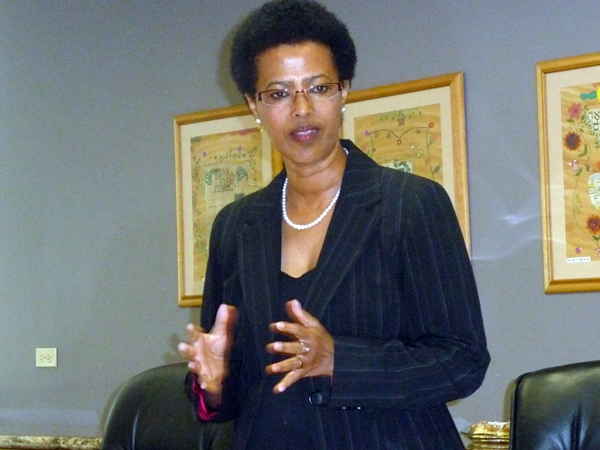
THE JEWISH CITIZEN
Reversing the high dropout rate from schools priority for Ethiopian-Israelis
By Donald H. Harrison
 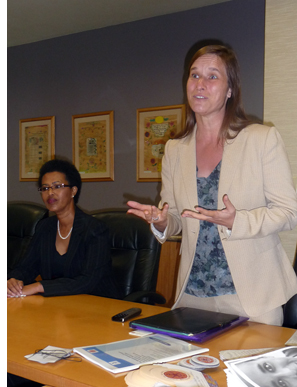 SAN DIEGO—Nighist Mengesha is one of only seven Ethiopian-Israelis who has an academic doctorate, but in her capacity as director general of the Ethiopian National Project (ENP) in Israel she is working hard to change all that. SAN DIEGO—Nighist Mengesha is one of only seven Ethiopian-Israelis who has an academic doctorate, but in her capacity as director general of the Ethiopian National Project (ENP) in Israel she is working hard to change all that.
Mengesha and Grace Rodnitzki (right), ENP director of international relations, briefed staff members and guests of the United Jewish Federation of San Diego on Monday, Sept. 23, about ENP’s challenges and successes in its campaign to increase living standards, education and hope among Ethiopian Israelis, 70 percent of whom live below the poverty line.
Mengesha’s story is far from typical. She explained that since the time that she was a ninth grade student living in Ethiopia’s Gondar province she knew that she wanted to live in Israel. She told of traveling with seven friends as a young teenager to the Ethiopian port of Massawa, where they heard that an Israeli fishing boat might take them to the Eretz. But as she was a juvenile and had no sponsor in Israel, she was not permitted to make aliyah.
Years later, as a mother of four children and married to a fellow social worker, she decided to try again. She obtained a letter guaranteeing acceptance from Hebrew University in a social work program, but the Ethiopian government declined to give her an exit visa. As she was already doing social work, more studies would be a waste of time, a bureaucrat reasoned. So, through correspondence, she received another invitation: to study computer science at Ben-Gurion University in Be’ersheva.
The Ethiopian government readily agreed that Ethiopia needed computer scientists, so issued her an exit visa—with two heavy provisos. First, she would be subject to a fine if after four years she did not return to her native country. And second, far more onerous, her husband and four children between the ages of 2 and 6 could not go with her, but must remain at home.
Mengesha discussed all this with her husband, and they decided that she should nevertheless go; that somehow, a way would be found for the family to be reunited in Israel. As luck would have it, when she arrived in Israel by commercial flight on September 11, 1984, it was almost exactly the same time as Operation Moses, when Ethiopian Jewish refugees were whisked to Israel from camps in the Sudan.
Mengesha volunteered to utilize her skills as a social worker to help the Ethiopians plucked from the desert to make the transition to life in Israel. With some emotion, she recounted to her UJF listeners that the children in that Operation, some of whom were barefoot and wore only T-shirts and were carrying as their only possessions jerry-cans of water, today are included in the ranks of university graduates.
Within four months of her arrival, the Israeli government somehow was able to get her husband and children out of Ethiopia, and her family was reunited. She subsequently received a bachelor’s degree from Bar-Ilan University, and then went on to a master’s degree from Hebrew University. Her doctorate was through Essex University of the United Kingdom.
She organized AFIDEL, which in Amharic is an acronym for an Ethiopian self-help organization. Realizing that difficulty in adapting to the education system was one of the greatest problems Ethiopian children were encountering in Israel, she decided to go back to school to add teaching credentials to her already formidable academic accomplishments.
With such a resumé she became the director general of the Ethiopian National Project which brought together Ethiopian self-help groups, as well as Israeli governmen and Diaspora Jewish agencies that had set up programs to speed the acculturation of the Ethiopians to Israel.
Rodntizki was born in King of Prussia, Pennsylvania, and, like Mengesha, was an early enthusiast for making aliyah. However, she was told by an Israeli shaliach in Pennsylvania that she ought to first go to college so that she could bring something of substance to Israel. She followed that advice and was graduated from Brandeis before she immigrated to Israel in 1990. Within a year, there was another mass migration of Ethiopian Jews to Israel through Operation Solomon, which airlifted them from the capital city of Addis Ababa during a time of great political instability in Ethiopia.
Rodnitzki was drawn to the cause of the Ethiopian immigrants. Today, she told the UJF gathering, Ethiopian-Israelis number roughly 115,000 people, more than half of them under the age of 18. About 70 percent of the Ethiopian-Israeli community lives under the Israeli poverty line. Ethiopian-Israeli communities are plagued with a higher percentage of school dropouts, instances of domestic violence, and increasing rates of juvenile delinquency, she added.
One of the guiding principles of the Ethiopian National Project is that Ethiopian-Israelis should have more direct responsibility for their futures. Rather than starting programs for the Ethiopians, projects should be begun in cooperation with them, Rodnitzki stressed. In cities throughout Israel, commissions were created with the mayors serving as chairmen and leaders from the Ethiopian-Israeli community serving as vice chairmen, she said. By design, half of the board members sitting around conference tables in the various cities were Ethiopian-Israelis.
The Ethiopians-Israelis, along with the Israeli government and various non-governmental agencies, decided to try to deal holistically with the many problems Ethiopian-Israeli were facing. They decided that the best place to start, with potentially the greatest impact, was with teenagers. The idea was to provide for the teenagers constructive outlets for their energy at places where they could encounter good role models.
Rodnitzi explained that when she was growing up in Pennsylvania, there were before-school programs, such as choir, and after-school programs such as sports available to her for free. In Israel, however, there are no government funds for extracurricular school activities so they must be financed by the families of the students. Guess which families can’t afford to pay for their children to participate in extracurricular programs—those living below the poverty line.
Rodnitzki said that pupils who are not doing well in school soon become discouraged, and take a very negative view of themselves—particularly if there are no other areas such as extracurricular activities in which they can excel and develop a sense of self-confidence and self-worth.
So, to tackle the problem of the high dropout rates, ENP set up after-school centers where the Ethiopian-Israeli kids could participate in sports and cultural activities, receive help on their homework, computer time and the like. She told UJF that the programs, located in various cities throughout Israel, typically operate rent free, in some cases in buildings that are otherwise underutilized.
Programs through the centers also are devised for parents and community leaders to narrow the acculturation gap between the generations.
Rodnitzki reported that within one year, the percentage of Ethiopian students who could qualify for university educations in Israel had increased from 17 percent to 31 percent.
As a contributing agency to United Jewish Communities (formerly known as United Jewish Appeal), the United Jewish Federation of San Diego financially contributes to the programs to improve the lives of Ethiopian-Israelis. Purpose of the briefing was so Federation staff members could answer some of the questions San Diego County residents might have about the social absorption of the Ethiopian olim.
The two ENP executives themselves may be reached for more information about the program via email at negist_enpcontact@ujc.org.il and grace_enpcontact@ujc.org.il
Oranges and Maps at Soille San Diego Hebrew Day School
Security spending for Jewish institutions
in Australia varies from state to state
By Garry Fabian
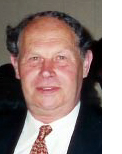 MELBOURNE—Security appeals in both Victoria and New South Wales got underway this month with one big difference: NSW is seeking $20 million, while Victoria is looking to raise $100,000. MELBOURNE—Security appeals in both Victoria and New South Wales got underway this month with one big difference: NSW is seeking $20 million, while Victoria is looking to raise $100,000.
The contrasting appeal targets reflect the different ways the two states fund security.
In Sydney, the $20 million appeal will cover capital expenses associated with security, such as fences and reinforced walls and windows whereas, the Melbourne appeal will raise funds for the Community Security Group’s (CSG) operational budget.
In Melbourne, synagogues and other Jewish community buildings are largely expected to pay for their own security infrastructure.
This pressure has recently been alleviated slightly for schools, with a $20 million Federal Government grant for security infrastructure announced last year. Generous private benefactors also play a role in funding community security in the southern state.
In Sydney, community funding for almost all Jewish organisations comes via large-scale appeals. This year, as well as the annual Jewish Communal Appeal (JCA), a Jewish security appeal is seeking millions of dollars in donations.
“We don’t have a JCA equivalent in Victoria, so the process of raising funds [for building upgrades] is left up to the organisations,” said Anton Block, president of the Jewish Community Council of Victoria (JCCV).
“We’re way off doing something as sophisticated as [the Sydney security appeal], but it’s something we should strive for. The starting point is a Victorian Community Appeal. It’s in the planning stages.”
It is understood the JCCV and CSG would like to raise more money for community security in the short-term future and the figure suggested for Victoria is $15 million.
Meanwhile, in NSW, security appeal chairman Stephen Green said security was a “costly business”.
“This is not an area in which we can compromise,” he said. “It is the first appeal of its kind anywhere in the world ... and the first time that a Diaspora community has taken this sort of pre-emptive, proactive action.”
The $20 million the appeal hopes to raise will be used to secure 47 communal buildings in NSW, mainly in the form of building upgrades. The appeal comes in the wake of Parliament’s decision to pass legislation that allows donations for security costs to be tax deductible.
Green added: “Are we saying an attack is imminent? Who knows? This appeal is not to unnecessarily scare people, but [upgrading security] is the responsible thing to do to protect our way of life.”
Sydney Liberal leader has ties to Jewish community
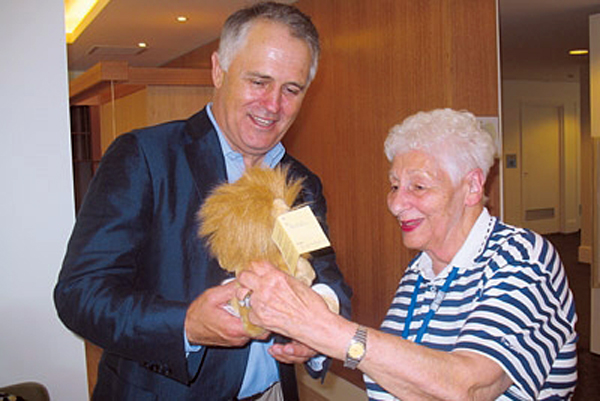
Jewish candidates make impact in local elections
SYDNEY - Despite a record showing, only a handful of Jewish candidates appear to have clinched seats on various Sydney councils after elections were held last Saturday.
Among the projected winners -- with most of the votes tallied -- is sitting Waverley Liberal councillor Tony Kay, 56, who appears a shoo-in to hold onto his seat, with the party garnering about 35 per cent of the vote in Waverley Ward.
First-time Liberal candidate Yvonne Coburn, 47, who sat second on the ticket in Hunter Ward, is also likely to nab a seat with the ticket seizing 51 per cent of votes. "I am absolutely delighted to be representing the people of Waverley," Coburn said. "There are so many issues at grass-roots level that need innovation and fresh thinking. As a management consultant, I feel I have the passion, skill set and capability to assist."
Kay added: "We had done an enormous amount of hard work to achieve that result, and we deserve it."
The third vacancy in Waverley's Hunter Ward, however, was still too close to call at this time, with Independent Miriam Guttman-Jones -- who led an all-Jewish ticket -- holding strong with 13 per cent of the vote, just three percentage points behind Greens candidate Virginia Milson, before postal and pre-poll votes were factored in.
"If it does go my way, I will work very hard to serve the electorate," said Guttman-Jones, who expected to receive confirmation by the week's end.
"Waverley has been dominated by a Labor-Greens coalition. If a Greens candidate comes up, the coalition stays. If people think it's bad now with the parking rangers, it's only going to get worse."
In the next district over, the Liberal Party also scored big seating candidates on Woollahra Council.
Woollahra councillor Isabelle Shapiro, 57, running first on the Liberal ticket for Bellevue Hill Ward, was re-elected with the group receiving 51 per cent of votes.
Sitting Liberal councillor and law student Anthony Boskovitz also won by a landslide in Vaucluse Ward -- the ticket garnered a whopping 54 per cent of votes.
Liberal candidate Marc Gold, 24, running second on the ticket for Lane Cove Council in East Ward, also had a good first run, with his ticket receiving 33 per cent of the vote -- but it just may fall short of securing him a seat.
The same goes for Independent Andrew Schaverien, 21, who ran first on the ticket for the North Shore's Willoughby City Council in Naremburn Ward with 14 per cent.
Those who didn't fare as well were Waverley Council Labor candidate Lorin Blumenthal, who received 10 per cent of the vote in Hunter Ward, and the all-Jewish Independent ticket led by Leon Goltsman in Waverley Ward, which received a paltry three per cent.
Independent Vivien Reed also failed in her bid for a seat on Randwick Council in the North Ward.
Toltz short-listed for the 2008 Man Booker Prize
SYDNEY- Steve Toltz, 36, is a Jewish screenwriter whose debut novel A Fraction Of The Whole has made it into the final round for the prestigious literary prize, together with five other novels.
He is the only Australian author on the shortlist.
Toltz's 650-page novel tells the story of the jailed Jaspar Dean and his complex relationship with his deceased father Martin and beloved uncle Terry. It spans a gamut of locales, from the Australian bush to Paris cafes and the jungles of Thailand.
Toltz said that the idea for his novel — which began as a 500-word short story — came from his "curiosity as to how it must feel for the children of those people who are skinned alive by the media, and also to explore how the child of a rebel rebels himself".
The Man Booker Prize is awarded annually to a writer from the Commonwealth or Ireland.
The prize, worth over $100,000 will be announced in London on October 14.
Toltz, who is planning to travel to the UK to attend the ceremony, is joined on the shortlist by award-winning English-Jewish author Linda Grant. Her book, The Clothes on their Backs, examines the lives of a Hungarian-Jewish family who fled Budapest prior to World War II.
Lobby group offers apology
MELBOURNE - A regional Victorian lobby group has removed a poster from its website that compared Premier John Brumby to Adolf Hitler.
An apology to the Jewish community was also issued on the ‘Plug the Pipe’ website early Friday and the group’s chairman admitted that the image was “extremely offensive”.
The apology came after Victorian parliamentarians and the Jewish Community Council of Victoria slammed the poster, which was pictured being carried by a woman at a protest rally.
The poster depicted Hitler and Brumby with the words “Can you spot the difference between these two dictators”.
Plug the Pipe is an organisation that opposes the transportation of water from northern Victoria to the city in a project known as the Food Bowl Modernisation Project. The group was in the news last month after it threatened to trespass Brumby’s rural property.
Australia Arava partnership begins to bloom
MELBOURNE—Don’t be surprised if on your next trip to Israel you see Limmud Oz advertised in the country’s southern Arava Region.
It is just one aspect of a comprehensive project that is gathering momentum called Partnership 2000.
The program, which was established by the Jewish Agency for Israel, sees regions in Israel paired with Diaspora communities. Australia has teamed up with the Arava because, according to the United Israel Appeal (UIA), “the Arava is a pioneering community isolated in the desert, which fits with Australia being a pioneering community and isolated from the rest of the world”.
Last month, eight Arava residents travelled to Melbourne for information gathering and planning sessions.
Miriam Munz, director of Melbourne’s Limmud Oz, led one of the sessions and spoke about starting up a Limmud Oz-style adult education program in the Arava. The Israeli participants indicated they would like to implement such a program at home.
Mark Chaskiel, director of FBI Travel, spoke to the group about tourism potential and opportunities, while Gandel Charitable Trust chief executive Laurence Joseph examined potential business opportunities in the mainly agricultural area.
Bruce Salvin, the chief executive at Jewish Care, discussed aging and community development, and a special panel, led by Bialik College principal Genia Janover, used its educational expertise to examine school leadership in the future.
Partnership 2000 is a joint collaboration between UIA, the Jewish National Fund and the State Zionist Council of Victoria. Individuals with interest or expertise in Israel are also involved.
In recent years, Australian teachers have made the trip to Israel, and students, teachers and other professionals from the Arava have visited Australia. Partnership 2000 was created to develop a sister city-type relationship and to foster cooperation and enhance community bonds.
Other Partnership 2000 ties include New York and Tel Aviv, Boston and Haifa, and San Diego and Sha'ar Hanegev
Wheels in motion for Junior Maccabi Carnival
SYDNEY - Preparations are well underway for Maccabi Junior Carnival, which will be held in Sydney early next year.
After a record turnout in Melbourne in 2007, organisers are hopeful of similar numbers for next year’s Junior Carnival, the 27th in the event’s history.
Victorian team managers Giselle Berlinski and Di Sherman are confident their state will be well represented in Sydney, as registration numbers continue to grow rapidly.
With the registration cut-off date October 3, Maccabi Victoria is urging all potential participants to get on board as soon as possible in order to avoid disappointment, with the team quickly approaching maximum intake.
Sherman said the event will be unique and described Junior Carnival as “the embodiment of the Maccabi ethos, ‘Connecting our community through sport’.”
“It is a wonderful opportunity for our children to meet other Jewish children from communities throughout Australia and New Zealand, to connect through sport and social activities and to make friends for life,” Sherman said.
Sherman also said Sydney carnival will offer some new activities not seen before.
“This year’s carnival will be filled with exciting social activities, including Moonlight Cinema, pool parties, Maccabi Idol and many more.”
Vandals Target Maccabi Tennis Centre
MELBOURNE - The new home of the Maccabi Tennis Club, the Leon Haskin Tennis Centre, was the target of an anti-Semitic attack last week.
It is the fourth attack since the facility was opened in February this year, with the damage bill now estimated at more than $10,000.
In what the management said was a well-planned raid, vandals climbed onto the roof of the centre before re-arranging the letters on the front of the building to read "The Jew".
The attacks on the centre began in March, just one month after it was officially opened when the perpetrators attempted unsuccessfully to break into the clubhouse. Since then three more attacks have occurred, when wire fences have been cut, bottles and bricks have been thrown on the courts, nets torn down and significant damage has been inflicted on the playing surface. The clubhouse has also been vandalised with black spray paint.
While the most recent attack is the first of an overly anti-Semitic nature, club president Milton Levine, said he believed the incidents were linked.
"The last attack confirms that the attacks have been of an anti-Semitic nature, they're doing it because we are Jewish" Levine said.
"They weren't targeting the pavilion next door, which is the cricket and football club.”
He added that the latest attack was obviously planned and in order to carry out their attack, the vandals must have brought "glue" and spent time examining the letters within the sign "in order to turn an L into a J and an M into a W and so on.
According to Community Security Group (CSG) director Gavin Queit, the police have been informed and are set to investigate the incident.
The chief executive of the local council, Andrew Newton said he was "absolutely appalled" at the attack. "The council will work closely with the club and the police to prevent this from happening again and to catch those responsible" Newton said.
However, Levine said the police and council needed to do more to stop the vandalism.
"I am appealing to the council and to the police to take measures to ensure that this does not happen again. They know this is an issue; they know this is a problem. We've done what we can do as a club, but we need the support of the council and we need the support of the police to ensure this is not an ongoing situation.
New Zealand shul reopens with fanfare
AUCKLAND - Leader of the Opposition John Key, who is leading in the election polls against New Zealand Prime Minister Helen Clark, attended the reopening of Auckland Hebrew Congregation last week.
Key, the son of a Holocaust survivor, is the leading candidate for winning the November 8 elections. The National Party leader attended the reopening of Auckland's only Orthodox synagogue, the Auckland Hebrew Congregation, after it was closed for almost a year for major refurbishment, costing NZ$6.63 million.
Among the 500 attendees was Rabbi Jeremy Lawrence from the Great Synagogue in Sydney, who formerly served as rabbi of the congregation before moving to Sydney.
The new design for the synagogue was a community-driven initiative that puts men and women on one level, with a mechitzah down the centre, rather than women being seated on the balcony. The space has been designed to be able to be used in a more intimate setting for regular services, as well as providing a function centre.
The congregation consists of some 500 families.
Moriah College Student wins junior journalism award
SYDNEY - Ilana Gottlieb, a year 7 student at Moriah College, was awarded first prize in Shalom College's Junior Jewish Journalist competition for her article about the Israel Philharmonic Orchestra's July performances at the Sydney Opera House.
The competition, which was introduced in the brochure for the Sydney Jewish Writers Festival in August, drew approximately 20 entries from students in years 6 and 7.
The brochure invited "budding writers", aged 14 years or younger, to submit a news report on any item of Jewish interest that occurred between July 13-August 8. The subject could be a local, national or international event.
Shalom Institute director of adult education Peta Jones Pellach said: "We wanted to encourage young people to see themselves as 'real' writers. As you will see from the quality of Ilana's entry, as well as the runners-up, we have many young members of our community who already have acquired the skill of writing at a mature level.
“The competition provided an opportunity to showcase their talent. We also wanted young people who have this skill to apply it to a Jewish topic or theme.
“The Sydney Jewish Writers Festival encompasses the range of Jewish writing, including journalism, and we thought that, this year, young Jewish writers could put their minds to this particular genre."
Australian Jewish News Sydney editor Michelle Coleman, who was asked by Shalom College to judge the essays, said she was "impressed by the high standard of the entries".
"It was encouraging for the future of journalism to see budding writers of such a high calibre," she added.
Gottlieb received a large package of books, donated by Berkelouw Books and Lindfield Bookshop, for her winning essay.
"I worked really hard on the article but never expected to win," Ilana said..
"My English teacher, Miss Thorpe, has been one of the main influences in developing my writing skills. I also had inspiration for my article after my family took me to see the orchestra perform," she added.
Another Moriah College year 7 student, Nechama Basserabie, received the runner-up prize, with her article about Ethiopian immigration and integration.
Below is Ilana's winning article
By Ilana Gottlieb
On the 27 of July, Jews from all around Sydney flocked to the Opera house to hear the Israeli Philharmonic Orchestra perform Beethoven’s fifth and sixth symphonies.
The theatre was filled with the old and young alike, with young families and an overflowing bus with the residents from the Montefiore home. No doubt when the audience was searching for there seats they were talking the latest news and their expectations for the afternoon.
From the beginning of the performance to the last standing ovation, this concert was no less than magnificent and never to be forgotten.
The theatre was adorned with delicate blue and white flowers, which added even more to the grand atmosphere.
Under the guidance of the world renowned musician Zubin Mehta the IPO began the matinee with a superb performance of Beethoven’s sixth symphony.
The audience was awestruck- – and it showed with countless standing ovations. At interval you could distinctly hear the words “wonderful”, “splendid” and “glorious” being passed around the chatty masses of people.
The audience excitingly reentered the theatre in anticipation for the musical wonders which would follow.
The IPO performed Beethoven’s famous Fifth symphony with energy and power. When they had finished the last movement, there was a clear and pure silence with the audience struck for words.
Finally the theatre erupted in cheers and applause as Zubin Mehta exited the stage.
When Mehta reentered he uttered five single words which got quite a few laughs from audience.
“A little bit of Mozart” The IPO finished the concert with three frivolous pieces evocative of Vienna which were enthusiastically received by the audience.
This was an inspiring performance marking Israel’s 60th anniversary celebrations.
The orchestra has made a remarkable journey from its origins as a group of European musicians escaping Nazism by migrating to Palestine in 1936 to become the world renowned musical ambassadors of Israel.
Wishing all readers of San Diego Jewish World a Shana Tovah and well over the Fast. May the New Year - 5769 - bring health, happiness and peace in Israel and around the world.
Return to top
UNITED JEWISH FEDERATION OF SAN DIEGO

SAN DIEGO COMMUNITY COLLEGES

LAWRENCE FAMILY JCC, JACOBS FAMILY CAMPUS


THE PEOPLE OF THE BOOKS
Mourned love found again in a book
The History of Love by Nicole Krause; W.W. Norton, 2006, ISBN 978-039332862, 272 pages.
By Gail Feinstein Forman
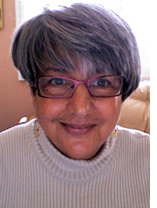 SAN DIEGO—The fallibility and strength of the human spirit is richly imagined in Nicole Krause’s novel, The History of Love. Krause deftly explores how a book chronicling the brief but passionate love between a young Jewish Polish man and Alma, the girl he loved, links disparate characters through a journey that leads to contemporary Brooklyn. SAN DIEGO—The fallibility and strength of the human spirit is richly imagined in Nicole Krause’s novel, The History of Love. Krause deftly explores how a book chronicling the brief but passionate love between a young Jewish Polish man and Alma, the girl he loved, links disparate characters through a journey that leads to contemporary Brooklyn.
Krause’s quirky characters remain true to themselves as they live the lives they have invented. Leo Gursky the man who wrote the original manuscript in Poland, also called The History of Love, left his book behind with a friend when he escaped the Nazis just a short time after Alma left, too.
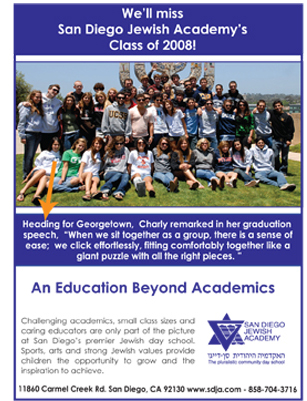 There were letters from Alma that placed her in New York, but Leo had to undergo harrowing circumstances to escape the Nazis before getting to New York. Remaining hidden in haystacks and fields, when he arrived in New York he described himself as “ a man who had become invisible.” Leo always thought his manuscript was lost in the wake of the war. And he tried to find Alma, but to no avail. There were letters from Alma that placed her in New York, but Leo had to undergo harrowing circumstances to escape the Nazis before getting to New York. Remaining hidden in haystacks and fields, when he arrived in New York he described himself as “ a man who had become invisible.” Leo always thought his manuscript was lost in the wake of the war. And he tried to find Alma, but to no avail.
As he forged ahead in America leading a lonely life as a now-retired locksmith, he kept his memory of Alma alive as his private inner sanctuary and strength. In his book, early on, he hinted of the tremendous impact the love between him and Alma had on him. Describing himself at the time, he wrote, “He fell in love. It was his life.”
Now in his eighties, his routine life consisted of Chinese take-out and a few hours of time kibbitzing with his friend in the apartment above him.
Leo’s life takes an unexpected turn when he finds out his and Alma’s early years had produced a son. The son was now a famous New York writer. And late in his life, he regains a connection to Alma.
Meanwhile, another Alma, Alma Singer, was a twelve-year girl also living in Brooklyn. Unbeknownst to Gursky, while her father was in Spain, Gursky’s book resurfaced in Spanish. Alma’s father sent the Spanish version of The History of Love to Alma’s mother as a gift before they were married.
Not knowing Spanish at the time, she learned to read one sentence at a time from studying Spanish on her own. After they got married, they named their daughter “Alma” after the main character in the book. They had no idea of the history of the book which Gursky originally had written in Polish.
Alma's father died when she was six and her mother, now an English translator of books and articles from Hebrew and Spanish, withdrew into her room with her grief for many years. Like Leo Gursky, it was the memory of her husband that seemed to give her life any meaning.
Alma also had a younger brother who called himself “Bird.” Their lives were also deeply affected by their father’s death. Alma was obsessed with survival training books and equipment as her father was an outdoorsman.” Bird,” like his mother, retreated into fantasy and considered that he might be one of the “lamed vovniks,” according to Kabbalist legend, one of the thirty-six righteous people who populated the world at any given time.
Alma’s mother’s life awakens again when she receives a request to translate The History of Love from Spanish into English. She maintains a correspondence with the requestor and Alma and her brother try to tie all these pieces together.
In an interview with litlovers.com, Krause remarks that she was moved early on by the idea that people “ need to invent things in order to survive.” The character, Leo, imagines when talking to the son he knows he will probably never meet, that he might say that the truth was something he invented “so I could live.” And each character in the book manufactures an elaborate mental framework to assuage the pain of loss.
The characters’ dialogues are pitch-perfect in every nuance. It is easy to see that Krause’s first forays into writing were in poetry. She makes every word matter. Also, Krause grew up with four grandparents, all from Eastern Europe and White Russia . This proximity appears to have given her a keen ear for the actual phrasing and occasions for humor and irony of everyday speech in their adopted English language.
At times, I found that the relationship between Alma and her brother “Bird” off-putting in its Salingeresque-like language reminiscent of Franny and Zooey. But it can easily be forgiven in a novel that so effectively illustrates the imperatives of love.
In The History of Love, Nicole Krause weaves an intricate tale of intrigue, inspiration and renewal. It is a compelling and satisfying journey of broken spirits made new again.
ISSUE DEDICATION

SAN DIEGO JEWISH WORLD: THE WEEK IN REVIEW
CAMPAIGN 2008
Sarah and George compared, contrasted by J. Zel Lurie in Delray Beach, Florida
What Israelis learn from U.S. elections by Ira Sharkansky in Jerusalem
INTERNATIONAL
Ahmadinejad protest planned in NYC on Thursday by a coalition of Jewish groups by Shoshana Bryen in Washington, D.C.
ARTS
A standing O for the 'girls' in the office by Cynthia Citron in Los Angeles
Song 'Meeskite' is opposite of its name by Cantor Sheldon Merel in San Diego, with accompanying music.
ADVENTURES IN SAN DIEGO JEWISH HISTORY
—February 10, 1950: Dr. T.R. Jackman To Speak
—February 10, 1950: Fund To Borrow $75,000 for Critical UJA Position
—February 10, 1950: Mrs. Steinman Elected To Nat’l Board of U.S.N.A.
—February 10, 1950: Overseas News and Views by Maxwell Kaufman
COMMUNITY WATCH
Agency for Jewish Education: AJE to offer immersion classes in Hebrew beginning next month
Lawrence Family JCC: 2008 San Diego Jewish Book Fair to feature celebrity authors Henry Winkler, Jonathan Safran Foer, Martin Fletcher, Evan Handler and 40 other writers
Soille San Diego Hebrew Day School: Soille Hebrew Day second graders learn about the mitzvah of tzedakah
CAMPAIGN 2008
Down Syndrome: Advice for Sarah Palin by Rabbi Nechemia Coopersmith in Jerusalem
Obama strongly supports Israel by Howard Wayne in San Diego
INTERNATIONAL
Ariel University Center's U.S. fundraising chief had had colorful career path by Donald H. Harrison in San Diego
Impressions of an Ethiopian American tourist on his first trip to Israel by Kassahun Teffera in Rockville, Maryland
JUDAISM
Why and how I observe the Shabbat by Sheila Orysiek in San Diego
ADVENTURES IN SAN DIEGO JEWISH HISTORY
—January 27, 1950: Temple Beth Israel
—January 27, 1950: Tifereth Israel Synagogue
—January 27, 1950: Beth Jacob
INTERNATIONAL
U.S. politicians should unite against Iran by Shoshana Bryen in Washington, D.C.
JUDAISM
Blessings of the city and the country by Rabbi Leonard Rosenthal in San Diego
The Chasid's mistake maybe wasn't one by Rabbi Baruch Lederman in San Diego
ADVENTURES IN SAN DIEGO JEWISH HISTORY
—January 27, 1950: Inside A.Z.A. by Leonard Naiman
—January 27, 1950: San Diego Bay City Bnai Brith
—January 27, 1950: Junior Matrons
—January 27, 1950: Judy Yukon Joins Quiz Kids
—January 27, 1950: Swing Your Partner
LETTERS TO THE EDITOR
—Thalheimer flip flopped; Hillel threatens neighborhood from Alice Goldfarb Marquis, Ph.D, in La Jolla
—Thalheimer article informative; will help voters from Gail Forman in San Diego
ARTS
A Jew's admiration for a Catholic songwriter produced superb show by Carol Davis in Solana Beach, California
SPORTS
A Bissel Sports Trivia With Bruce Lowitt in Oldsmar, Florida
NEWS FROM ADVERTISERS
Lawrence Family JCC: An invitation to 'meet' Pocohantas at the Lawrence Family JCC
San Diego Jewish Academy: SDJA's Ali Tradonsky semifinalist in U.S. Middle School Science competition
Soille San Diego Hebrew Day School: Children’s author Ian Cameron reads at Soille San Diego Hebrew Day School
INTERNATIONAL
Chance meeting in San Diego topic of amazement in Kibbutz Kfar Aza by Ulla Hadar in Kfar Aza, Israel
SAN DIEGO/ CAMPAIGN 2008
Jewish advocate for Mt. Soledad Cross seeks community votes in council race by Donald H. Harrison
JUDAISM
Archeologists debate Tanakh's accuracy by Fred Reiss in Winchester, California
ADVENTURES IN SAN DIEGO HISTORY
January 27, 1950: Jewish Labor Committee
January 27, 1950: Birdie Stodel Bnai Brith. Chapt. No. 92
January 27, 1950: Jewish War Veterans San Diego Post 185 Auxiliary
January 27, 1950: Hadassah
LETTERS TO THE EDITOR
—Temple of Dreams poem wins praise, from Susan D. Rhea in San Diego
—White Privilege' essay delights Obama supporter, from Fran Sesti in Carlsbad, California
NEWS FROM ADVERTISERS
Jewish Community Center: JCC Holiday Hours Reminder
Jewish Community Foundation: Ways that you may contribute for the relief of Hurricane Ike victims
Thursday, September 18, 2008 (Vol. 2, No. 225)
NATIONAL/CAMPAIGN 2008
‘White Privilege’ in the United States by Tim Wise in Topeka, Kansas
JUDAISM
The Akedah and my gay life decision by David Benkof in New York
SAN DIEGO
Children begin tiling Seacrest's Viterbi Wall at intergenerational barbecue by Gerry Greber in Encinitas, California
ARTS
Dreamgirls soars in S.D. Musical Theatre Co. production at the San Diego Rep by Carol Davis in San Diego
Thursdays With the Songs of Hal Wingard:
—#19, Young Hawks
—#227, Love Can Grow
—#325, Oh, oh, Love
ADVENTURES IN AN DIEGO JEWISH HISTORY
—January 27, 1950: Jewish War Veterans
—January 27, 1950: S.D. Hebrew Home For the Aged
—January 27, 1950: Cottage of Israel
—January 27, 1950: Paole Zion
INTERNATIONAL
JAFI is revitalizing the Zionist Dream by Zeev Bielski in Jerusalem
The Jews Down Under, a roundup of Australian Jewish News by Garry Fabian in Melbourne:
—Roozendaal sworn in as NSW Treasurer
—Younger Australians have less favoured view of Israel
—Australian Jewish News wins national award
—Jewish Business Tribunal comes closer to reality
—National community survey launched
—The Tax Man at the Shabbat Table
—Adelaide congregation marks 160th anniversary
—Jewish Farewell for Governor-General
—Calling all Genealogists
—Appeal for Assault Victim
—A Guiding Light in Beijing
—Something in a Lighter Vein
NATIONAL/ CAMPAIGN 2008
Why I won't vote for Barack Obama, commentary by Isaac Yetiv in La Jolla, California
ARTS
Students, celebrities decorate ceramic butterflies for SDJA's Holocaust project by Donald H. Harrison in San Diego
ADVENTURES IN SAN DIEGO JEWISH HISTORY
—January 27, 1950: Who’s New? (Maybe They Came From Your Home Town)
— January 27, 1950: Morgenthau To Make ‘Report to Nation’ On Coast to Coast Telephone Hookup, Jan. 31st
— January 27, 1950: Jewish Community Center by Lou Mogy
—January27, 1950: Pioneer Women (Negba) Club
NEWS FROM OUR ADVERTISERS
Reserve Now for Seacrest Village Retirement Community Anniversary Gala
Link to previous editions
< BACK TO TOP
|
|









 SAN DIEGO—Nighist Mengesha is one of only seven Ethiopian-Israelis who has an academic doctorate, but in her capacity as director general of the Ethiopian National Project (ENP) in Israel she is working hard to change all that.
SAN DIEGO—Nighist Mengesha is one of only seven Ethiopian-Israelis who has an academic doctorate, but in her capacity as director general of the Ethiopian National Project (ENP) in Israel she is working hard to change all that.
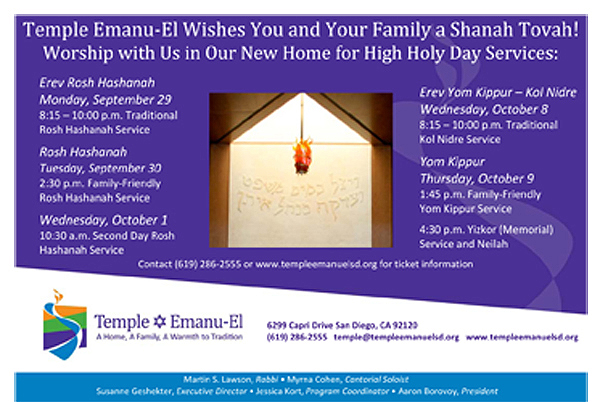

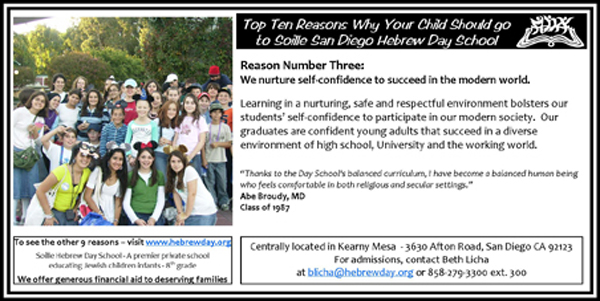
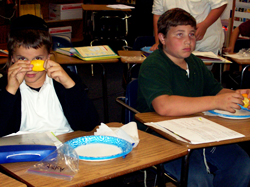 SAN DIEGO (Press Release)—Soille Hebrew Day Sixth Graders could be seen Thursday morning handing carved out orange peels to Mrs. Callaway. Mrs. Callaway challenged students to flatten half a carved out orange without tearing it, putting holes in it, or distorting it in any way. The challenge was, of course impossible, and students sat in wonder. How could this possibly relate to a social studies class? The answer...It is impossible to create a map of the world, which is a sphere - just like an orange, without stretching or distorting it. Students learned about different distortions of maps and how that affects how we read them and use them. Mrs. Callaway did an excellent job teaching students with this unique
SAN DIEGO (Press Release)—Soille Hebrew Day Sixth Graders could be seen Thursday morning handing carved out orange peels to Mrs. Callaway. Mrs. Callaway challenged students to flatten half a carved out orange without tearing it, putting holes in it, or distorting it in any way. The challenge was, of course impossible, and students sat in wonder. How could this possibly relate to a social studies class? The answer...It is impossible to create a map of the world, which is a sphere - just like an orange, without stretching or distorting it. Students learned about different distortions of maps and how that affects how we read them and use them. Mrs. Callaway did an excellent job teaching students with this unique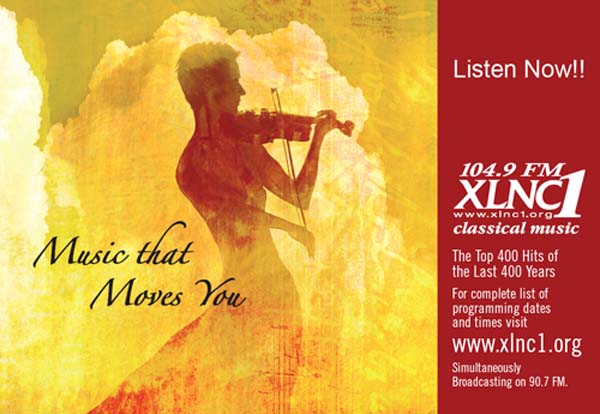
 MELBOURNE—Security appeals in both Victoria and New South Wales got underway this month with one big difference: NSW is seeking $20 million, while Victoria is looking to raise $100,000.
MELBOURNE—Security appeals in both Victoria and New South Wales got underway this month with one big difference: NSW is seeking $20 million, while Victoria is looking to raise $100,000.



 SAN DIEGO—The fallibility and strength of the human spirit is richly imagined in Nicole Krause’s novel, The History of Love. Krause deftly explores how a book chronicling the brief but passionate love between a young Jewish Polish man and Alma, the girl he loved, links disparate characters through a journey that leads to contemporary Brooklyn.
SAN DIEGO—The fallibility and strength of the human spirit is richly imagined in Nicole Krause’s novel, The History of Love. Krause deftly explores how a book chronicling the brief but passionate love between a young Jewish Polish man and Alma, the girl he loved, links disparate characters through a journey that leads to contemporary Brooklyn. 



